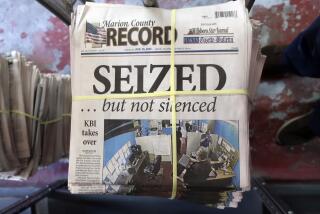Wall Street Indictment Called a First : Securities: An ex-brokerage official is charged with knowingly using a forged document to discredit a customer.
- Share via
NEW YORK — In the first case of its kind, a federal grand jury in New York indicted a former Shearson Lehman Bros. official Thursday on charges that he knowingly used a forged document in an attempt to discredit a customer who had filed a complaint against Shearson.
The case highlights the problem of document forgery, which some experts say is commonplace in the brokerage industry and could lead to investors being denied full compensation for losses incurred as a result of brokerage wrongdoing.
Law enforcement officials said the indictment is the first they know of charging a brokerage firm compliance officer with using what amounts to dirty tricks to undermine a customer’s claim.
Forgery of documents by brokerage employees is often alleged by customers in arbitration cases. But such charges almost never lead to criminal prosecution because authorities haven’t viewed them as a high priority.
The indictment charges Edward Coyle, 36, with two counts of mail fraud and one count of maintaining false books and records. Coyle, who resigned from Shearson last month, had been the compliance officer at Shearson’s large retail brokerage office on 5th Avenue in Manhattan. Compliance officers are responsible for seeing that brokers obey securities laws and rules.
Coyle’s lawyer, John Siffert, said Coyle denies the charges.
Howard E. Heiss, head of the U.S. attorney’s securities fraud unit in Manhattan, declined to comment on whether other indictments are expected. But he said the indictment shows that the office is interested in prosecuting brokerage firm forgery cases.
The investigation that led to the indictment resulted from a series of articles in the Los Angeles Times in July showing that firms knowingly employed brokers with long records of cheating customers and that forgery of documents was commonplace. The incident that led to the indictment, involving former Shearson broker Charles M. Lewis, was detailed in the series. Lewis was mentioned in the indictment but wasn’t charged.
The episode involved an arbitration case filed in 1989 against Shearson and Lewis by a former customer, Carole W. Davis. In the arbitration case, she charged that Lewis “churned” her account, rapidly buying and selling securities solely to generate brokerage commissions. Davis allegedly lost more than $133,000 while Lewis and Shearson took in more than $70,000 in commissions.
The arbitrators eventually awarded Davis $70,200. But during the hearing, Shearson lawyers tried to impeach Davis’ credibility, introducing a photocopy of a letter purporting to bear her signature, stating that she had been aware of the unusual trading in her account and had approved of it.
Coyle testified in the arbitration case that the letter was authentic. The indictment charges that Coyle, a friend of Lewis’, knew the document had been forged by photocopying Davis’ signature onto it from another unrelated document she had signed. It also charges that Coyle lied under oath about his record-keeping practices.
Davis’ lawyer, Stanley M. Ackert III, said the phony letter may have persuaded the arbitrators to award Davis much less than the full amount of her losses. “It certainly cast a shadow on my client’s credibility,” he said.
Siffert, Coyle’s lawyer, said his client denies the charges and will plead not guilty at an arraignment scheduled for Feb. 4. Steven H. Faigen, a Shearson spokesman, said the firm “has cooperated fully with the U.S. attorney’s office and the firm is not a target of its investigation.”
Faigen said Lewis, 62, “retired” from Shearson last month. However, an employee in the New York state attorney general’s office said Lewis’ computerized record contains a notation indicating that his departure from Shearson “was not voluntary.” Lewis’ lawyer, Ronald Russo, described him as “a highly regarded broker.” Russo said he was “certainly unaware” of any wrongdoing by Lewis.
Lewis, with Shearson since 1979, was one of the firm’s veteran brokers and a frequent press commentator on the stock market. The Times reported that since 1989, four arbitration cases have been filed against Lewis, alleging churning and other improprieties that cost him and Shearson more than $315,000 in judgments and settlements.
If convicted, Coyle faces a maximum sentence of 30 years in prison and $1.5 million in fines.
More to Read
Inside the business of entertainment
The Wide Shot brings you news, analysis and insights on everything from streaming wars to production — and what it all means for the future.
You may occasionally receive promotional content from the Los Angeles Times.










